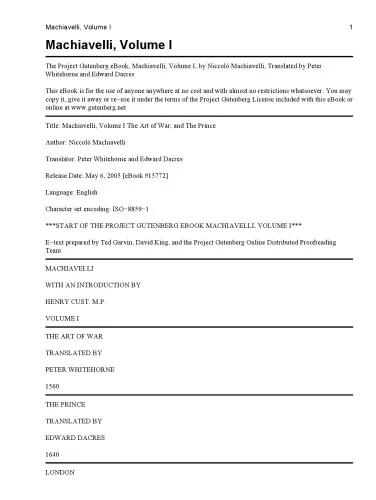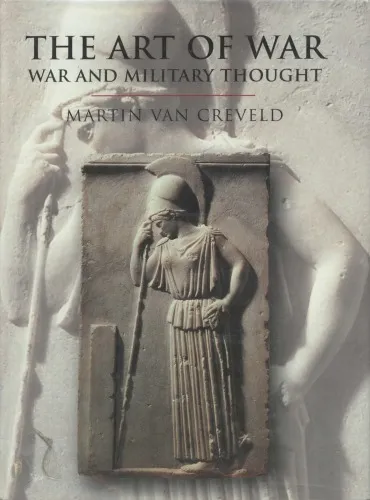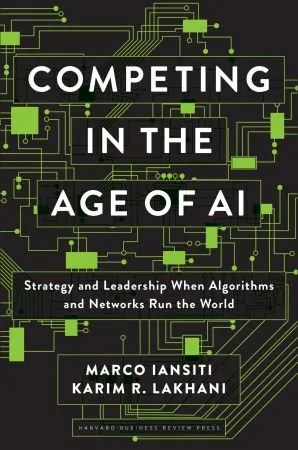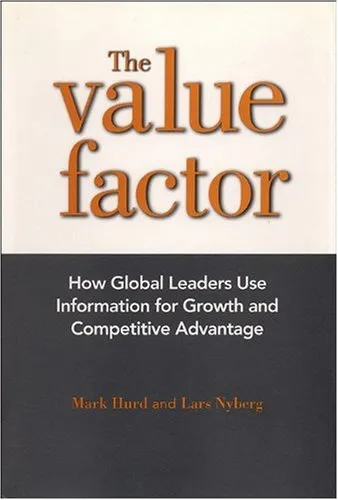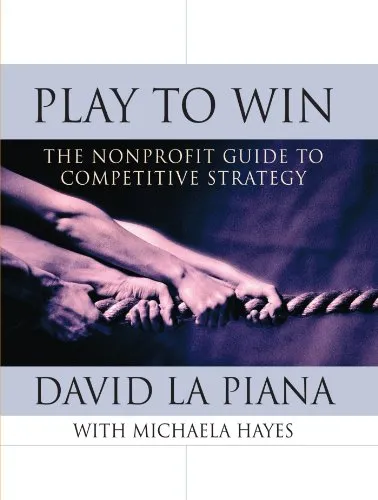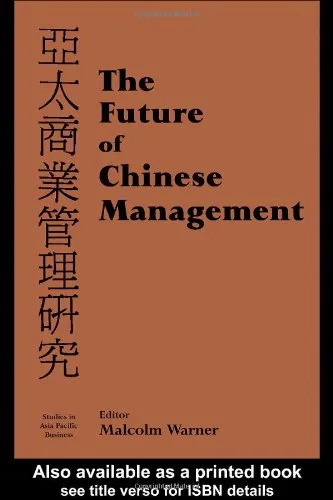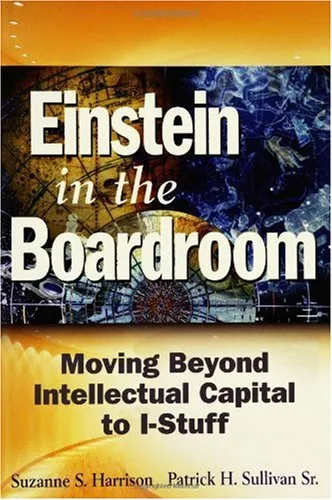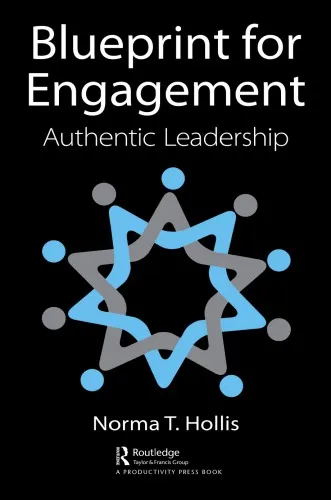The Art of War and The Prince
4.5
بر اساس نظر کاربران

شما میتونید سوالاتتون در باره کتاب رو از هوش مصنوعیش بعد از ورود بپرسید
هر دانلود یا پرسش از هوش مصنوعی 2 امتیاز لازم دارد، برای بدست آوردن امتیاز رایگان، به صفحه ی راهنمای امتیازات سر بزنید و یک سری کار ارزشمند انجام بدینکتاب های مرتبط:
مقدمه کتاب 'The Art of War and The Prince'
آثار 'The Art of War و The Prince' به عنوان شاهکارهای نیکولو ماکیاولی با تمركز بر استراتژی، سياست و تواناییهای رهبری به عنوان منابعی ضروری برای هر فردی که به دنبال درک عمیقتری از هنر جنگ و سیاست است، مطرح هستند. در این مقدمه، نگاهی به خلاصه کتاب، برجستهترین نکات آن، جملات معروف، و دلیل اهمیت این کتاب خواهیم داشت.
خلاصه کتاب
'The Prince' یک رساله سیاسی است که به عنوان راهنمایی برای زمامداران در اوايل دوره رنسانس نوشته شده است. ماکیاولی در این کتاب به اصول و قواعد حکومتی و حفظ قدرت میپردازد و عموماً به عنوان اثری بنیادی در عرصه فلسفه سیاسی مدرن شناخته میشود. او با پرداختن به ماهیت انسان و دستگاههای حکومتی، تلاش میکند تا به رهبران بیاموزد چگونه در دنیایی پیچیده و گاه بیرحم به موفقیت برسند.
'The Art of War' یا همان 'هنر جنگ' از جمله آثار نظامی کلاسیک است که به بررسی استراتژیها و تاکتیکهای ضروری برای پیروزی در میدان نبرد میپردازد. ماکیاولی در این اثر بر تحلیل جنگهای تاریخی و تعاملات نیروهای نظامی تمرکز میکند و اصولی را جهت دستیابی به پیروزی در نبرد ارائه میکند که حتی امروزه نیز قابل استفاده و ضروری هستند.
نکات کلیدی کتاب
یکی از برجستهترین نکات این آثار، تأکید بر اهمیت فهم ماهیت انسان و بهرهبرداری از نقاط قوت و ضعف اوست. در 'The Prince'، ماکیاولی اشاره به این دارد که حاکمان باید بتوانند در مواقع نیاز، رفتارهایی غیراخلاقی نشان دهند تا منافع حکومت را تأمین کنند. همچنین در 'The Art of War'، او بر ضرورت استفاده بهینه از منابع و آمادهسازی دقیق نیروها تأکید میکند.
هر دو کتاب میل به دستیابی به اهداف مشخص را از طریق شجاعت، برنامهریزی دقیق و درک عمیق از دینامیکهای قدرت برجسته میکنند که این ویژگیها، کاربران را در هر نوع استراتژی موفقی یاری میدهند.
جملات معروف از کتاب
- "هر جنگی از فریبکاری تشکیل شده است."
- "بهتر است ترسیده باشند تا دوست داشتنی."
- "موفقیت تحت حکومت شخصی است که بتواند انتظارات و تغییرات را مدیریت کند."
چرا این کتاب اهمیت دارد
این کتابها به خاطر دیدگاههای نوین در مورد قدرت و سیاست، جایگاه خاصی در تاریخ تفکر سیاسی به خود اختصاص دادهاند. ماکیاولی با ارائه بینشهایی در زمینه تصمیمگیریهای استراتژیک، به رهبران آموخت که چگونه در مقابل چالشهای مختلف به بهترین شکل عمل کنند. این آثار به عنوان رهنمودی برای شناخت و استفاده از قدرت سیاسی و نظامی نه تنها در زمان ماکیاولی بلکه در عصر حاضر نیز باقی میمانند.
با خواندن این آثار، خوانندگان میتوانند بهترین راهبردها و تاکتیکها را برای رسیدن به اهداف خود بیابند و در حوزههای مختلف زندگی از آنها استفاده کنند. اهمیت این کتابها در این است که درک عمیقتری از هنر رهبری و سیاست را به ما میآموزند و ما را به سوی بینشهای جدیدی در جهان پیچیدهی امروز هدایت میکنند.
Introduction to 'The Art of War and The Prince'
Niccolò Machiavelli's works, 'The Art of War' and 'The Prince', stand as monumental contributions to political philosophy and military strategy. Written during the Renaissance, these texts offer a pragmatic approach to leadership, power, and warfare that remains relevant today. Combining insights into statecraft and the principles of successful war campaigns, these books are essential for understanding the complexities of human governance and conflict.
Detailed Summary of the Book
'The Art of War' is not a single-volume strategy manual but centers on a comprehensive understanding of military operations. Structured as a series of dialogues between a theorist and experienced generals, it extends beyond mere tactical maneuvers to encompass logistics, adaptative strategy, and the psychological aspects of war. Machiavelli emphasizes the importance of discipline, adaptability, and the morale of troops, advocating for a citizen army as a source of national strength.
'The Prince', on the other hand, serves as a guide for rulers on how to acquire and maintain power. Diverging from medieval ideals of virtue, Machiavelli introduces a new, realist paradigm, where the ends justify the means. He elucidates on topics such as fortune versus strategy, the occasional necessity for cruelty, the art of deception, and the virtues of both being feared and loved. His ideas challenge traditional ethics, proposing that sometimes, perceived immoral acts are essential for ensuring stability and power in governance.
Key Takeaways
- Pragmatism Over Idealism: Both works stress the importance of practical application of methods over idealistic values.
- The Role of Adaptability: Success in both war and governance hinges on the ability to adapt to changing circumstances.
- Understanding Human Nature: Insight into the motivations and behaviors of people is crucial in predicting actions and reactions in both the political and military realms.
- Power Dynamics: Gaining and maintaining power requires not only strategic acumen but also a deep understanding of human psychology and systemic structures.
Famous Quotes from the Book
"It is better to be feared than loved, if you cannot be both." - The Prince
"The more sand has escaped from the hourglass of our life, the clearer we should see through it." - The Prince
"Whosoever desires constant success must change his conduct with the times." - The Art of War
Why This Book Matters
'The Art of War and The Prince' maintain their significance through their exploration of timeless themes such as power, leadership, and conflict. Machiavelli’s insights provide a foundation for modern strategic thinking. His work has influenced countless leaders across various domains, from political figures to corporate executives, illustrating the universal application of his ideas. The clear, candid examination of power structures and human interaction makes 'The Art of War and The Prince' an enduring study of strategic success and governance. They encourage readers to approach challenges tactically, with a conscious understanding of the ethical and practical dimensions of their actions.
دانلود رایگان مستقیم
شما میتونید سوالاتتون در باره کتاب رو از هوش مصنوعیش بعد از ورود بپرسید
دسترسی به کتابها از طریق پلتفرمهای قانونی و کتابخانههای عمومی نه تنها از حقوق نویسندگان و ناشران حمایت میکند، بلکه به پایداری فرهنگ کتابخوانی نیز کمک میرساند. پیش از دانلود، لحظهای به بررسی این گزینهها فکر کنید.
این کتاب رو در پلتفرم های دیگه ببینید
WorldCat به شما کمک میکنه تا کتاب ها رو در کتابخانه های سراسر دنیا پیدا کنید
امتیازها، نظرات تخصصی و صحبت ها درباره کتاب را در Goodreads ببینید
کتابهای کمیاب یا دست دوم را در AbeBooks پیدا کنید و بخرید
1402
بازدید4.5
امتیاز0
نظر98%
رضایتنظرات:
4.5
بر اساس 0 نظر کاربران
Questions & Answers
Ask questions about this book or help others by answering
No questions yet. Be the first to ask!
